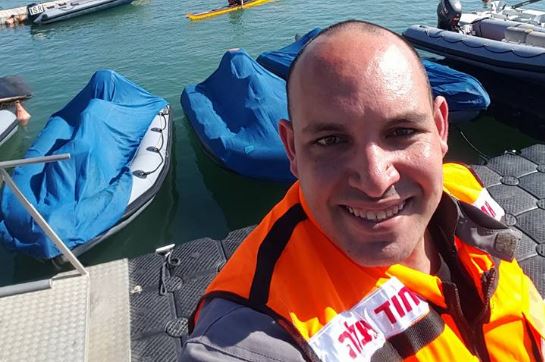“That is our job and that is why I love it. I get to help make the community I live in a better and safer place,” explains an EMT volunteer for United Hatzalah.
Yoni Uziyahu lives and works in Bat Yam, a city just south of Tel Aviv, and has been an EMT (emergency medical technician) volunteer first responder for the past four years. As a volunteer first responder, Yoni leaves his home, his family and his work, all at a moment’s notice, to answer the call of the EMS (Emergency Medical Services) dispatcher whenever it comes over his radio. As his chapter’s local spokesperson, Uziyahu also receives real-time updates regarding every emergency that occurs in the vicinity of Bat Yam-Holon and passes on the relevant updates to the media. He does all of this on a completely voluntary basis, receiving not a penny in return.
Uziyahu is an ambucycle rider (a motorcycle that contains all of the same medical equipment as an ambulance with the exception of a stretcher) who often arrives at the scene of a medical emergency among the first responders if he isn’t the first himself. “Even when I am at work, if something happens nearby, I drop whatever I am doing, leave my fellow workers and head out to help the person in need of medical attention,” said Uziyahu.
According to Uziyahu, that attitude is shared by all of the 3,200 EMT personnel of Israel’s United Hatzalah volunteer organization. Whether lawyers, handymen, computer software engineers, or truck drivers, they all drop what they are doing at a moment’s notice and head out to save a life. “The idea behind the organization is to provide a fast and professional community response to any medical emergency that takes place before the ambulance can arrive. The first few minutes of a medical emergency are critical and can often make the difference between life and death,” Uziyahu explained.
“We usually have a response time of less than three minutes, and many times we are even faster than that arriving within 90 seconds. We respond from within the community itself so that medical help comes from nearby, sometimes even from the same building or right next door. We help our neighbors, friends, relatives, and complete strangers. We get their fast so that we can minimize the trauma and suffering of the patient. That is our job and that is why I love it. I get to help make the community I live in a better and safer place,” he added.
Uziyahu recounted a story that made a lasting impression on him. “Approximately three years ago, I responded to an emergency where a 50-year-old man had collapsed without a pulse and was not breathing. I raced over and arrived in less than two minutes. When I got to the scene I immediately began CPR and attached a defibrillator. The patient received two shocks and his pulse returned after the second. I continued to provide him with oxygen and waited for the ambulance to arrive. It took them 17 minutes to get there. Had I not been there to help him, it is quite likely that he wouldn’t be with us today. That feeling, of knowing I made a difference and saved a person’s life, is exactly why I do what I do.”
Courtesy, United Hatzalah
